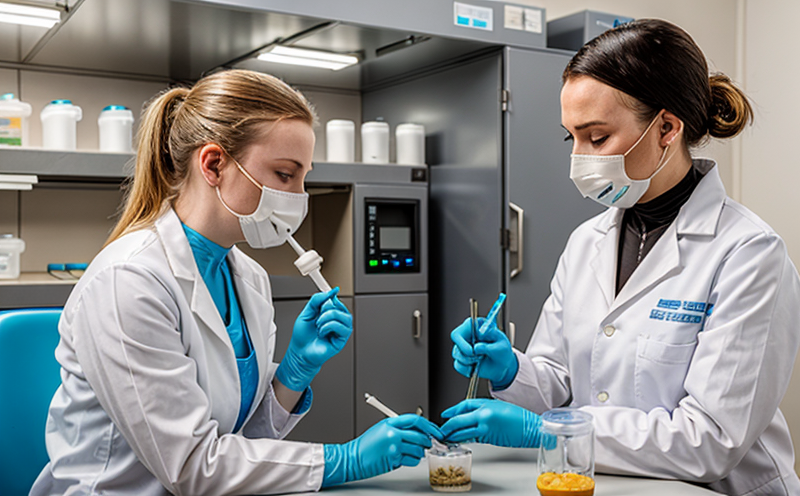EN 17299 T-2 and HT-2 Toxin Residue Analysis in Oats
The analysis of T-2 and HT-2 toxins in oats is crucial for ensuring food safety and quality. These mycotoxins are produced by Fusarium fungi, which can contaminate grains during the growing, harvesting, or storage phases. Compliance with international standards such as EN 17299 ensures that producers, processors, and suppliers meet regulatory requirements set forth to protect public health.
Our laboratory adheres strictly to the methodologies prescribed in EN 17299, using advanced analytical techniques like Liquid Chromatography-Mass Spectrometry (LC-MS) for precise quantification. This method offers high sensitivity and specificity, enabling accurate detection even at trace levels of T-2 and HT-2 toxins.
During the specimen preparation process, oats are ground to a fine powder before extraction using appropriate solvents. The extracted samples undergo thorough purification steps to remove interfering substances, ensuring clean and reliable results. Our team employs rigorous quality control measures throughout each step of the procedure, from sample receipt to final report generation.
The acceptance criteria for T-2 and HT-2 toxin residues in oats are stringent, typically set at levels below 1 μg/kg as specified by EN 17299. Failure to meet these limits can lead to product recalls or regulatory penalties. By providing accurate test results compliant with this standard, we help our clients maintain their reputation for delivering safe and high-quality products.
Our service goes beyond mere compliance; it focuses on helping you understand the implications of mycotoxin contamination within your supply chain. We offer comprehensive consultation services aimed at identifying potential sources of contamination early in production processes. Additionally, our team can assist with implementing preventive measures to minimize future risks associated with Fusarium fungal growth.
The importance of this analysis cannot be overstated given its role in safeguarding consumer health while also maintaining market competitiveness. In an increasingly globalized food industry where regulations vary by region, having a trusted partner who understands local and international standards is invaluable.
Industry Applications
| Application Area | Description |
|---|---|
| Food Manufacturing | Ensuring compliance with regulatory limits for T-2 and HT-2 toxins in oats used as raw materials. |
| Agriculture & Grain Handling | Monitoring storage conditions to prevent fungal infestations that could lead to toxin contamination. |
| Retail Supply Chains | Verifying product quality and safety before distribution, protecting brand reputation. |
| Regulatory Compliance | Meeting international standards like EN 17299 to avoid legal issues and ensure safe products. |
| R&D & Development | Investigating contamination sources during product development phases. |
Eurolab Advantages
At Eurolab, we pride ourselves on offering unparalleled expertise in mycotoxin testing. Our state-of-the-art facilities equipped with cutting-edge technology allow us to deliver reliable and accurate results consistently.
We have a team of highly skilled professionals dedicated solely to food and feed testing. Their extensive experience ensures that every test is conducted according to the highest standards, yielding consistent and repeatable outcomes. This dedication extends beyond just technical proficiency; our staff also understands the importance of communication with clients throughout the entire process – from initial consultation through final report delivery.
Our commitment does not stop there. We invest heavily in ongoing training programs for our personnel to stay abreast of any changes or updates related to mycotoxin regulations and analytical techniques. This ensures that when you choose Eurolab, you are working with experts who have the latest knowledge available.
Competitive Advantage and Market Impact
By providing accurate EN 17299-compliant tests for T-2 and HT-2 toxins in oats, we position ourselves as leaders in food safety and quality assurance. This not only enhances our clients' reputations but also strengthens their competitive edge in the marketplace.
In today’s highly regulated environment, consumers are becoming increasingly aware of potential health risks associated with mycotoxin exposure. Companies that can demonstrate adherence to strict standards like EN 17299 gain significant credibility among both consumers and regulators alike. This can translate into increased sales and market share for those who prioritize safety first.
Furthermore, by partnering with Eurolab, businesses avoid costly mistakes such as non-compliance fines or product recalls due to contaminated oats. Our proactive approach allows them to address issues early on in the supply chain before they become major problems down the line.





